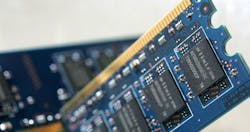Chip Industry's Biggest Risk Isn't a US Trade Spat
A tit for tat between Beijing and Washington wouldn't be good for the Chipmaker to the Stars, its founder and outgoing chairman told the Financial Times.
"China does a lot of assembling of the final product, so the U.S.-China trade dispute may impact us also,” Morris Chang said.
I suspect Chang may have been dumbing down his analysis, because I'm sure he knows full well that the bigger risk to Taiwan Semiconductor Manufacturing Co. isn't some short-term disruption to end-product manufacturing.
Where the real risk lies is in having his clients lose orders to Chinese substitutes. Right now, there are few alternatives to the chips that Qualcomm Inc., Broadcom Corp. and Nvidia Corp. design, and TSMC is their primary supplier. But when new options do become available, there's a greater chance TSMC won't be contracted to make them.
President Xi Jinping has committed China to technology independence, which includes learning how to manufacture the world's most advanced semiconductors at its own factories.
The Wall Street Journal reported last week that government-backed China Integrated Circuit Industry Investment Fund Co. is set to unveil a 300 billion yuan ($47 billion) war chest, the latest big check to be written for the country’s chip sector.
In addition to the risk that Chinese chip designs will get better comes the possibility they’ll start forcing U.S. clients to outsource to Chinese foundries. There are currently more than 20 fabs being developed in China due to various government incentives, TSMC warned in its 2017 annual report.
To counter this, TSMC is plowing ahead with a new fab in China after maintaining for years one wasn't necessary. The Hsinchu, Taiwan-based firm has proven over the past three decades that being close to neither client nor assembly line is crucial to its business model. Were that the case, it would have fabs in both California and Shenzhen.
But the paradigm is shifting, and TSMC is learning to adjust.
"It is a new challenge," Chang said of the trade spat. "And it is something that I have not had to face in the past."
This from a man who experienced a Japan-U.S. trade war in his previous role at Texas Instruments Inc., and watched China lob missiles over his head in a bid to cow Taiwan's fledgling democracy just as TSMC was hitting its stride.
TSMC managed to break free of rivals United Microelectronics Corp. and IBM Corp. by the early 2000s, and more recently, has managed to best Samsung Electronics Co. But a band of hungry Chinese contenders fueled by bucket loads of cash is the real challenge, and something Chang didn’t have to face in the past.
by Tim Culpan
